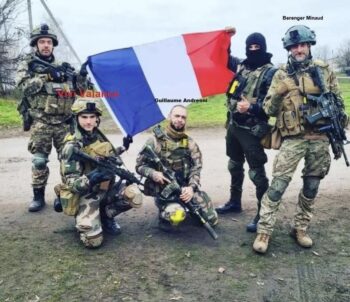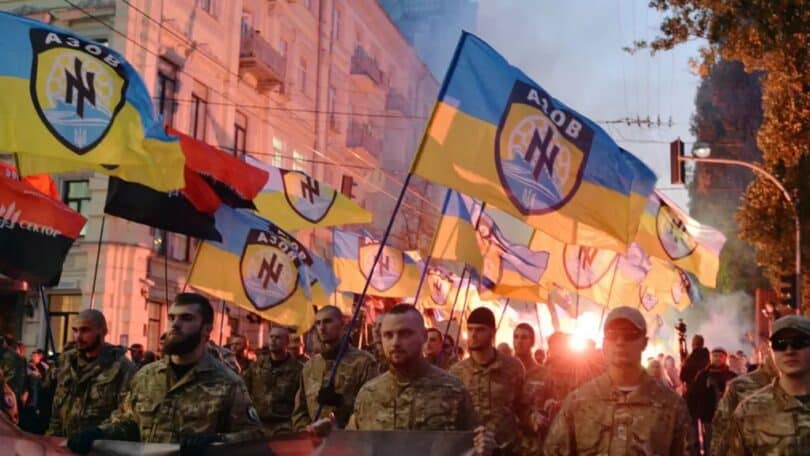The war-torn east European country is a mecca for some of the most odious people on earth. What sort of threat does this pose to their home countries?
 At the end of April, two French neo-Nazis—Alan Vineron and Guillaume Andreoni—who had joined the Armed Forces of Ukraine as mercenaries, were arrested and convicted in their home country. Two months earlier, one of them had posted photos of three executed Russian prisoners on social media.
At the end of April, two French neo-Nazis—Alan Vineron and Guillaume Andreoni—who had joined the Armed Forces of Ukraine as mercenaries, were arrested and convicted in their home country. Two months earlier, one of them had posted photos of three executed Russian prisoners on social media.
However, Vineron and Andreoni were detained not because of any war crimes, but for attempting to smuggle weapons and munitions back home, including rifle scopes and magazines for machine guns. After a brief trial, they were sentenced to 15 months in prison each, nine of them to be served conditionally.
This incident is only the first sign of things to come. According to French media, about 400 French citizens are taking part in the armed conflict in Ukraine. Of these, about 100 are directly involved in the fighting, and about 30 are well-known far-right extremists.
It’s not just Paris that will soon face the prospect of militant neo-Nazis returning home. Observers note that the number of volunteer foreign fighters in Ukraine has reached thousands.
The French and their ‘adventures’ in Ukraine
According to the French media outlet Mediapart, France’s General Directorate for Internal Security had its eye on the suspects long before the incident. Despite this, they were detained only thanks to a random check at customs.
Vineron (also known as “Vivi”) is a retired fighter of the elite French Chasseurs Alpins (Alpine Hunters) unit. He was dismissed from the army after his neo-Nazi views came to light in the media. Shortly before returning home, he posted a photo on the “TrackANaziMerc” Telegram channel, showing three Russian soldiers shot in the head. The image shows that the soldiers were unarmed and killed at close range. After the photos of the execution began circulating online, Russia’s Investigative Committee announced that it would examine the crimes of French mercenaries against Russian prisoners of war in Ukraine.
Vineron’s accomplice, known as “Bones” by his military callsign, was also previously linked to a far-right neo-Nazi group which has long-standing ties with Ukrainian extremists.
The “Zouaves Paris” group—it ironically derives its name from the Berber tribe Zwawa, which in turn became known as the French army’s first “indigenous” regiment—supported Ukraine and established contact with local fighters from the neo-Nazi Azov regiment. In December 2019, the leader of the far-right group, Marc de Cacqueray-Valmenier, traveled to the country to personally meet Azov fighters and visit their training camp.
In January 2022, a month before the start of Russia’s military operation, Zouaves Paris was banned in France. However, its ties with Ukrainian extremists had nothing to do with the ban—a month earlier, the group had attacked anti-racism demonstrators who tried to disrupt a far-right rally in support of presidential candidate Eric Zemmour.
The ban did not particularly affect the neo-Nazis. Zouaves Paris supporters from the “Ouest Casual” Telegram channel are still singing the praises of Ukrainian fighters and are using Nazi symbols and phrases alluding to various far-right movements in France and Germany. In their posts, they refer to Russian troops as “the Asian hordes of Soviet imperialism that have once again taken over Europe,” and to Chechen units as “Putin’s Muslim dogs.” They use similar duplicate channels to raise funds for the needs of militants and collaborate with neo-Nazis from other countries.
The group boasts of its presence in Ukraine, posting photos of its Ukrainian supporters and stickers of French right-wing organizations. It has also created backup platforms in case the main Telegram channel is blocked.
All roads lead to Ukraine
A little over a year ago, far-right terrorists from France killed the former Argentinian international rugby player Federico Martin Aramburu. One of the suspects, Loik Le Priol, was caught on the border between Hungary and Ukraine. According to official reports, the terrorist and former marine commando wanted to surrender to the Ukrainian authorities after committing the murder.
In November 2022, the Italian police announced the arrest of five members of local neo-Nazi group “Order of Hagal”. They had illegally stored weaponry, ammunition, tactical equipment, and a grenade launcher and further engaged in regular paramilitary training to prepare a terrorist attack in Naples.
Later, it became apparent that the group also maintained close ties with Ukraine’s Right Sector, Centuria, and Azov neo-Nazi units. One of its members was a fighter from the Azov. His accomplice, having “dangerously close ties with far-right Ukrainian nationalist groups,” planned to attack a police station in Naples, while the former Azov fighter himself was preparing a terrorist attack in a shopping mall.
The Italian police first became aware of the neo-Nazis back in 2019. In an intercepted conversation from January 2021, one of the militants, Giampiero Testa, threatened that he would “make a massacre like in New Zealand,” obviously referring to the terrorist attack in Christchurch that resulted in the deaths of 51 people in 2019. Incidentally, in his manifesto, the New Zealand terrorist stated that he had trained in the Azov battalion in Ukraine, and wore neo-Nazi symbols.
These ties between the neo-Nazis are mutual. According to a 2020 investigation by the Combating Terrorism Center (CTC) at West Point, the New Zealand shooter’s manifesto became popular among Ukrainian paramilitary units. It was even translated into the Ukrainian language and sold as a book by a 22-year-old Kiev resident, becoming a kind of artifact. The center added that Ukraine “holds a particular attraction for white supremacists, activists and adventurers” largely due to the establishment and development of the Azov regiment and other state-supported paramilitary formations.
Over the years, Azov has encountered no impediment to growth and has become a powerful and extensive organization. The more it grew, the more support it received from the Ukrainian state. Azov’s ideological influence on Ukrainian society has helped to shape the country’s modern agenda. In the 2010s, the organization actively organized youth camps that taught basic military training and ideology. As noted in the Combating Terrorism Center report, the public declarations of Ukrainian far-right extremists attracted ultra-rightists from Europe, the United States, and other countries.
Far-right extremist puppet theater
In the same CTC report, Ukraine is dubbed the first country where the “overtly far-right white nationalist militia [is] publicly celebrated, openly organizing, and with friends in high places.”
As a result, Ukraine has become a meeting point for far-right extremists from all over the world. The foundation for this was laid long before the start of hostilities in February 2022.
Joachim Furholm was a foreign mercenary in Ukraine and later a recruiter of Western extremists. Furholm is a Norwegian fascist activist who was briefly imprisoned after an attempted bank robbery. He also became well-known for sympathizing with the terrorist Anders Breivik. In 2018, he joined the Foreign Legion in Ukraine and began recruiting American neo-Nazis to the Azov unit.
“It’s like a petri dish for fascism. It’s the perfect conditions,” Furholm said about Ukraine in an interview. Referring to the Azov unit, he said that “they do have serious intentions of helping the rest of Europe in retaking our rightful lands.” Later on the “Azov” podcast, Furholm urged listeners to get in touch with him on Instagram. When a young man from New Mexico reached out, the Norwegian urged him to join the fighting in Ukraine saying,
Come over here, boy. A rifle and beer are waiting for you.
Surprisingly, after making an appearance on the far-right podcast, Furholm wasn’t ostracized by the media. After speaking at an Azov rally in 2018, he went on to give an interview to the U.S. government-controlled RFE/RL.
The case of the American mercenary and former U.S. Army veteran Craig Lang is even more striking. Lang made headlines when he attempted to blow up his pregnant wife with anti-personnel landmines. In 2015, after serving a prison sentence, he joined the Right Sector ultranationalist organization along with another army veteran, Alex Zwiefelhofere. BuzzFeed reported that Craig recruited dozens of Western militants to Ukrainian paramilitary units.
In 2016, Lang joined the Georgian National Legion, which fought on the side of Ukraine in eastern Donbass. Leaked documents revealed that he beat, tortured, and killed local civilians. According to the publishers of the leak, one of the videos shows Lang beating and drowning a girl after a fellow fighter injected her with adrenaline so that she would not lose consciousness while drowning. Lang and other militants committed these atrocities as members of the Right Sector unit.
Despite the fact that Lang has been charged in a double murder case in the United States, his lawyer Dmytro Morhun told Politico that he had returned to the battlefield. In the summer of 2022, he was seen on social media “ in a Ukrainian military uniform and brandishing an anti-tank weapon.”
Paul Gray is another prominent example of the petri-dish effect. The Iraq war veteran and Purple Heart recipient was a well-known fascist activist in the United States before joining the pro-Ukrainian militants. Despite this, Gray made numerous media appearances, including on Fox News, where he was portrayed as a heroic soldier, his neo-Nazi views never surfacing.
According to media reports, a document compiled by the U.S. Customs and Border Protection Service, intelligence, and other domestic security services, shows that many American militants have traveled to Ukraine. The evidence in these cases being recorded interviews with the extremists themselves, conducted by the law enforcement agencies.
Interestingly, one of the questions listed in the document was,
What kind of training are foreign fighters receiving in Ukraine that they could possibly proliferate in U.S. based militia and white nationalist groups?
In July 2022, Europol warned that “the proliferation of firearms and explosives in Ukraine could lead to an increase in firearms and munitions trafficked into the EU via established smuggling routes or online platforms” and “this threat might even be higher once the conflict has ended.”
This means that Ukraine isn’t just turning into a mecca for neo-Nazis, but also poses a threat for the West. A report by the UK’s Intelligence and Security Committee of Parliament shows that British citizens who have traveled overseas for “Right-Wing Terrorism-related purposes” have been “further radicalized” and “developed connections” with others who share their violent ideology. At the same time, the report indicates that there is currently “no process” in place to monitor these people following their arrival home.

